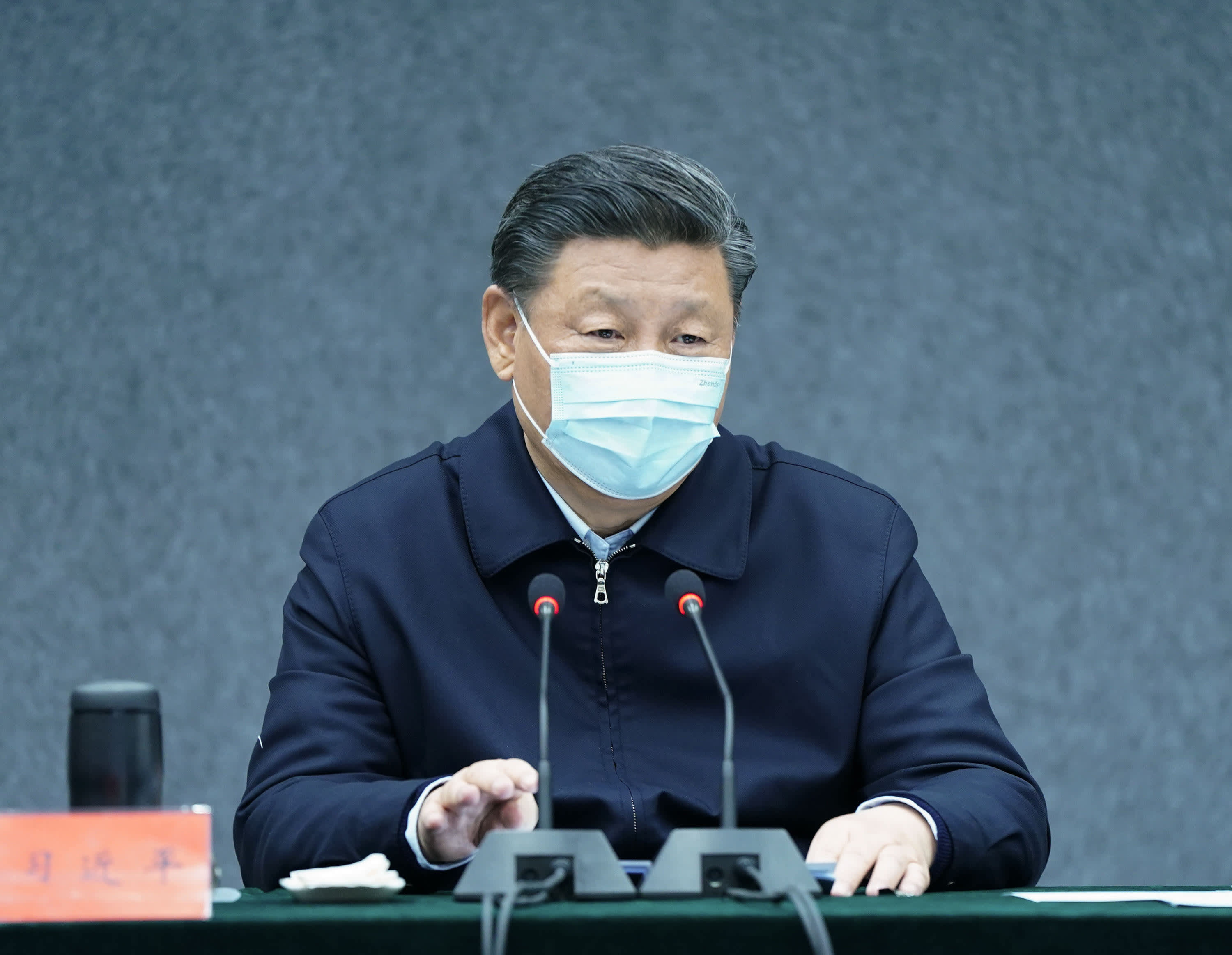
Chinese President Xi Jinping, also general secretary of the Communist Party of China Central Committee and chairman of the Central Military Commission, chairs a symposium at the School of Medicine at Tsinghua University in Beijing, capital of China, March 2, 2020.
Yan Yan | Xinhua News Agency | Getty Images
Chinese President Xi Jinping flew into Wuhan city on Tuesday morning to inspect new coronavirus control efforts, according to state news broadcaster CCTV.
The visit marks the latest step in the leader's public turnaround on involvement in fighting the disease, which has killed more than 3,100 people in the country after emerging in Wuhan in late December. Officially called COVID-19, the disease has now hit more than 100 countries including the U.S. and several in Europe. Fears of the virus' impact to worldwide economic growth have sent global markets reeling.
While the spread of the virus accelerated in January, Xi took a relatively low-key stance and first addressed the disease publicly in a Jan. 20 statement carried by state media that called for "resolute efforts" in fighting the virus. Instead, his second-in-command Li Keqiang is leading a national-level virus prevention and control leading group, and visited Wuhan on Jan. 27, more than a month ago.
I always felt that the number one signal for the Chinese government having enough confidence to declare this as the end would be when President Xi goes to Wuhan.
Mark Matthews
Bank Julius Baer
Xi began to take a more prominent public role in fighting the virus in mid-February. Notably, on Feb. 15, the Communist Party journal "Qiushi" published a Feb. 3 speech in which the president claimed to have known about the disease as early as Jan. 7.
Since then, Xi's public statements and appearances at virus-prevention sites have only increased. The Chinese leader has emphasized the need to balance preventing the spread of the disease with supporting the economy, which has struggled to resume normal activity due to lockdowns and other efforts to limit the highly contagious virus' spread.
State media such as People's Daily, China's official newspaper for the Communist Party, showed videos of Xi's visit to Wuhan on Tuesday.
"(Xi) will use the episode to underpin his personal authority," Tom Rafferty, Principal Economist, China, The Economist Intelligence Unit, said in an email.
"China will also extol its approach controlling the coronavirus as a model for other countries currently in the early stages of outbreaks," Rafferty said. "We expect it to offer direct assistance to containment efforts elsewhere, especially in Belt and Road Initiative countries."
There are more and more imported cases into China, and therefore the spreading of coronavirus from imported cases ... So I am not that optimistic.
Iris Pang
chief economist for Greater China, ING
Xi's visit to Wuhan comes as the number of new confirmed cases, mostly in the city or other parts of the surrounding Hubei province, has dwindled to below 50 a day. State media reported Sunday that 11 of 14 makeshift hospitals in Wuhan for treatment of the new coronavirus have closed.
"I always felt that the number one signal for the Chinese government having enough confidence to declare this as the end would be when President Xi goes to Wuhan," Mark Matthews, managing director and head of research Asia at Bank Julius Baer, told CNBC's "Street Signs Asia."
"So the fact that you see he's there I think is extremely important for the economy and for the market," Matthews said.
Major mainland Chinese stock indexes jumped more than 1% as markets reopened for the Tuesday afternoon trading session.
Iris Pang, chief economist for Greater China at ING, was more cautious about calling an end to the spread of the disease in the country.
"There are more and more imported cases into China, and therefore the spreading of coronavirus from imported cases. And also, the (return of workers to the) office and also factories might also create another wave of coronavirus cases in China," she told CNBC's "Capital Connection" on Tuesday. "So I am not that optimistic."
— CNBC's Yen Nee Lee and Abigail Ng contributed to this report.
https://news.google.com/__i/rss/rd/articles/CBMicmh0dHBzOi8vd3d3LmNuYmMuY29tLzIwMjAvMDMvMTAvY2hpbmEtcHJlc2lkZW50LXhpLWppbnBpbmctdmlzaXRzLXd1aGFuLWZpcnN0LXRpbWUtc2luY2UtY29yb25hdmlydXMtb3V0YnJlYWsuaHRtbNIBdmh0dHBzOi8vd3d3LmNuYmMuY29tL2FtcC8yMDIwLzAzLzEwL2NoaW5hLXByZXNpZGVudC14aS1qaW5waW5nLXZpc2l0cy13dWhhbi1maXJzdC10aW1lLXNpbmNlLWNvcm9uYXZpcnVzLW91dGJyZWFrLmh0bWw?oc=5
2020-03-10 08:33:51Z
52780653787133
Tidak ada komentar:
Posting Komentar